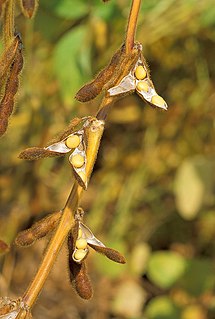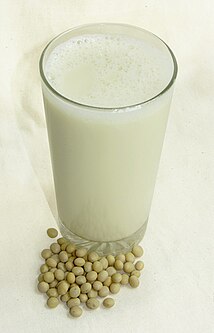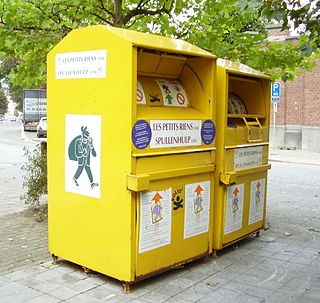Related Research Articles

A textile is a flexible material made by creating an interlocking bundle of yarns or threads, which are produced by spinning raw fibers into long and twisted lengths. Textiles are then formed by weaving, knitting, crocheting, knotting, tatting, felting, bonding, or braiding these yarns together.

The soybean, soy bean, or soya bean is a species of legume native to East Asia, widely grown for its edible bean, which has numerous uses.

Infant formula, baby formula or just formula or baby milk, infant milk ,false milk, or first milk, is a manufactured food designed and marketed for feeding to babies and infants under 12 months of age, usually prepared for bottle-feeding or cup-feeding from powder or liquid. The U.S. Federal Food, Drug, and Cosmetic Act (FFDCA) defines infant formula as "a food which purports to be or is represented for special dietary use solely as a food for infants by reason of its simulation of human milk or its suitability as a complete or partial substitute for human milk".

Rayon is a synthetic fiber, made from natural sources of regenerated cellulose, such as wood and related agricultural products. It has the same molecular structure as cellulose. Viscose can be used as synonym for rayon. Many types and grades of viscose fibers and films exist. Some imitate the feel and texture of natural fibers such as silk, wool, cotton, and linen. The types that resemble silk are often called artificial silk.

Soya milk also known as soy milk or soymilk, is a plant-based drink produced by soaking and grinding soybeans, boiling the mixture, and filtering out remaining particulates. It is a stable emulsion of oil, water, and protein. Its original form is an intermediate product of the manufacture of tofu. Originating in China, it became a common beverage in Europe and North America in the latter half of the 20th century, especially as production techniques were developed to give it a taste and consistency more closely resembling that of dairy milk. Soya milk may be used as a substitute for dairy milk by individuals who are vegan or are lactose intolerant.

Lecithin is a generic term to designate any group of yellow-brownish fatty substances occurring in animal and plant tissues which are amphiphilic – they attract both water and fatty substances, and are used for smoothing food textures, emulsifying, homogenizing liquid mixtures, and repelling sticking materials.
The International Code of Marketing of Breast-milk Substitutes is an international health policy framework for breastfeeding promotion adopted by the World Health Assembly (WHA) of the World Health Organization (WHO) in 1981. The Code was developed as a global public health strategy and recommends restrictions on the marketing of breast milk substitutes, such as infant formula, to ensure that mothers are not discouraged from breastfeeding and that substitutes are used safely if needed. The Code also covers ethical considerations and regulations for the marketing of feeding bottles and teats. A number of subsequent WHA resolutions have further clarified or extended certain provisions of the Code.

A label is a piece of paper, plastic film, cloth, metal, or other material affixed to a container or product, on which is written or printed information or symbols about the product or item. Information printed directly on a container or article can also be considered labelling.

Soy allergy is a type of food allergy. It is a hypersensitivity to ingesting compounds in soy, causing an overreaction of the immune system, typically with physical symptoms, such as gastrointestinal discomfort, respiratory distress, or a skin reaction. Soy is among the eight most common foods inducing allergic reactions in children and adults. It has a prevalence of about 0.3% in the general population.

Okara, soy pulp, or tofu dregs is a pulp consisting of insoluble parts of the soybean that remain after pureed soybeans are filtered in the production of soy milk and tofu. It is generally white or yellowish in color. It is part of the traditional cuisines of Japan, Korea, and China. Since the 20th century, it has been used in the vegetarian cuisines of Western nations.

Soy protein is a protein that is isolated from soybean. It is made from soybean meal that has been dehulled and defatted. Dehulled and defatted soybeans are processed into three kinds of high protein commercial products: soy flour, concentrates, and isolates. Soy protein isolate has been used since 1959 in foods for its functional properties.

Textile recycling is the process of recovering fiber, yarn or fabric and reprocessing the textile material into useful products. Textile waste products are gathered from different sources and are then sorted and processed depending on their condition, composition, and resale value. The end result of this processing can vary, from the production of energy and chemicals to new articles of clothing.
In China, the adulteration and contamination of several food and feed ingredients with inexpensive melamine and other compounds, such as cyanuric acid, ammeline and ammelide, are common practice. These adulterants can be used to inflate the apparent protein content of products, so that inexpensive ingredients can pass for more expensive, concentrated proteins. Melamine by itself has not been thought to be very toxic to animals or humans except possibly in very high concentrations, but the combination of melamine and cyanuric acid has been implicated in kidney failure. Reports that cyanuric acid may be an independently and potentially widely used adulterant in China have heightened concerns for both animal and human health.
Sustainable fashion is a movement and process of fostering change to fashion products and the fashion system towards greater ecological integrity and social justice. Sustainable fashion concerns more than just addressing fashion textiles or products. It addresses the entire manner in which clothing is produced, who produces it, and how long the life span of a product is before it reaches the landfill. This sustainable movement combats the large carbon footprint that the fashion industry and fast fashion have created by reducing greenhouse gas emissions. Reducing the environmental impact of fashion can combat air pollution, water pollution and overall climate change that could possibly prevent millions of premature deaths over the next century.

Soy yogurt, also referred to as soya yogurt, soygurt or yofu, is a yogurt-like product made with soy milk.

Artificial silk or art silk is any synthetic fiber which resembles silk, but typically costs less to produce. Frequently, "artificial silk" is just a synonym for rayon. When made out of bamboo viscose it is also sometimes called bamboo silk. When made of wood pulp, it is called artificial silk.
Robert Allen Boyer was a chemist employed by Henry Ford, he was extremely proficient at inventing ways to convert soybeans into paints and plastic parts used on Ford automobiles. Robert Allen Boyer, your average “B” chemistry student was given an extraordinary opportunity that changed his future and the future of automobile production in the U.S. (Plastic) Boyer, born on 30 September 1909 in Toledo, Ohio was given this chance when Ford hired his father to run the nation's oldest hotel, the Wayside Inn, in South Sudbury, Massachusetts. Ford frequented the inn and that is where Boyer was discovered. Ford claimed that Boyer had a “keen active mind”. He asked Boyer to enroll in the new Henry Ford Trade School and participate in its unique work-study program instead of following his plans to enter Andover prep school and then Dartmouth College (Shurtleff). Boyer excelled in the Ford Trade School and took to exploring concepts such as how to manufacture synthetic wool from soybeans. These were the types of problems that stumped the experts (Plastic). Boyer graduated the Ford Trade School at the age of 21 with a promising chemistry career in front of him. He started this career as the head of the soybean lab at the Edison Institute (Shurtleff). Here Boyer’s career took off. He started working to use soybeans in ways they had never been used before. Boyer has done things from extracting lubricating and paint oils from the soybean to creating a synthetic wool made from soybeans and pressing insulating varnish for starters and generators (Plastic). One of Boyer’s first projects began in 1932 and included building “a small solvent extractor to separate the bean into soy oil and protein-rich meal” (Shurtleff). The soybean oil became the most crucial commercial soy products on Ford cars. In 1934 the five to eight coats of lacquer that cars previously had been finished with was replaced with a synthetic baked enamel paint which contained about 35% soy oil. This new synthetic paint with soy oil saved considerable time and money. In 1937, Boyer developed a curved plastic sheet which he hoped would replace steel in the auto bodies of ford cars. He was so confident in his product that he took an axe to it in the middle of a crowd of reporters and critics. He also jumped up and down on the curved sheet. When there was no bending in the sheet and no shattering due to the axe and the weight of him jumping on the sheet, people were astounded (shurtleff). This soy protein plastic sheet consist of 70% cellulose and 30% resin binder pressed into cloth. “The new rust-free, dent-proof plastic was reportedly 50% lighter and 50% cheaper to produce than steel” (Shurtleff). This new plastic body cut the total weight of the car from 3,000 lb. to 2,000 (Dearborn). The sheets look like polished steel and can be bent but just snap back into place, therefore when caught in fender benders, the fender would bounce back like “rubber balls” (Shurtleff). Needless to say, this product was a breakthrough in the world of automobile production. Boyer also used the soy isolates to produce the world's first plant protein fiber in 1938. (Shurtleff.) This fiber resembled a soft wool, it was tan in color, had a medium luster and a soft warm feel. “it has 80% the strength of wool, took the same dyes, had good elongation, and did not wet as easily as wool.”(Shurtleff). Boyer figured this fiber could be used for upholstery in cars, filling in felt hats, or for clothing. Boyer changed the way the soybean was used and created innovative products we use daily.
Ecologic Brands, Inc. is an Oakland, California-based company that designs and manufactures bottles from recycled cardboard and newspaper.
Econyl regenerated nylon is a product introduced in 2011 by Aquafil. It is made entirely from ocean and landfill waste, such as industrial plastic, fabric scraps from clothing manufacturing companies, old carpets and "ghost nets". The product has been used by Stella McCartney, Kelly Slater's label Outerknown, Adidas and Speedo swimwear, Levi's, Breitling, Rapanui and Panarea Couture swimwear.

Textile Fiber Products Identification Act is a consumer protection act in the United States. The act protects the interest of producers and consumers by imposing regulations of labelling and advertising of textile products. The act specifies labeling requirements and numerous guidelines for the advertising of textile products that should qualify the compliance in accordance with the directions in the act. The Federal Trade Commission considers any form of misbranding to be illegal. Moreover, it also requires that the commission provide a generic name for each man-made fibre, in particular for those not yet named. "Natural" and "manufactured" fibers were among two major groups classified by the act, which also maintains a list of generic names that is updated with each new entrant.
References
- ↑ "Azlon | textile". Encyclopedia Britannica. Retrieved November 27, 2019.
- ↑ Eco-friendly products closer to your doorstep Archived February 16, 2008, at the Wayback Machine
- ↑ Meet the Azlons from A to Z: Regenerated & Rejuvenated Archived October 13, 2007, at the Wayback Machine
- ↑ Soy No-Show Brief Archived May 26, 2011, at the Wayback Machine
- ↑ Textile Labelling and Advertising Regulations Archived September 29, 2008, at the Wayback Machine
- ↑ Rules and Regulations Under the Textile Fiber Products Identification Act
- ↑ "Azlon | American Fiber Manufacturers Association". Archived from the original on February 28, 2017. Retrieved November 27, 2019.
{{cite web}}: CS1 maint: bot: original URL status unknown (link) - ↑ Glossary Archived February 17, 2008, at the Wayback Machine
- ↑ Inc, Time (October 28, 1946). LIFE. Time Inc.
- ↑ "aralac - Google Search". www.google.com. Retrieved November 27, 2019.
- ↑ Reusable Plastic Lab Supplies Archived March 12, 2008, at the Wayback Machine
- ↑ Scilabware, manufacturers of Azlon - Reusable Laboratory Plasticware Archived April 6, 2009, at the Wayback Machine